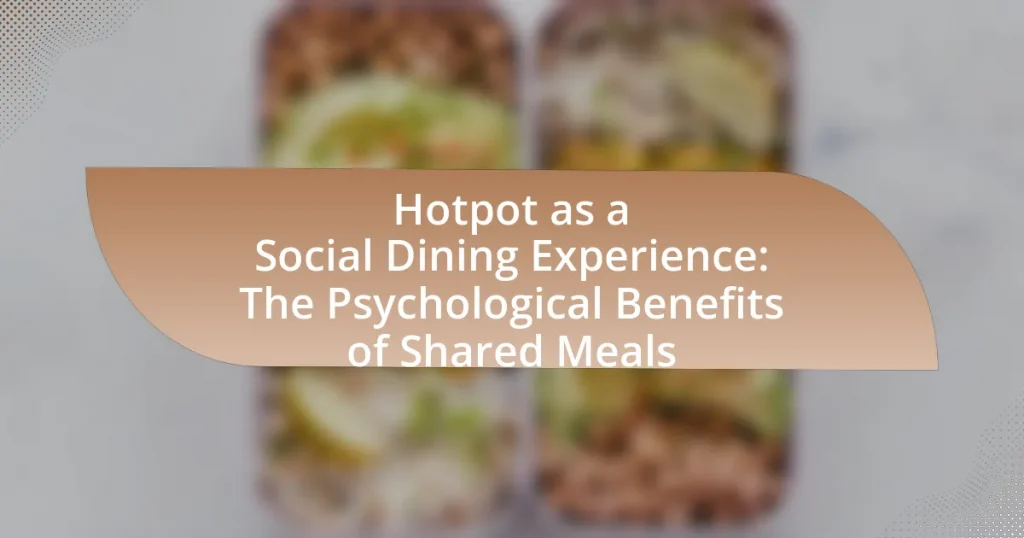Hotpot is a communal dining experience where participants cook raw ingredients in a shared pot of simmering broth, fostering social interaction and collaboration. This article explores the psychological benefits of shared meals, highlighting how hotpot enhances social bonds, communication, and feelings of belonging among diners. It discusses the cultural significance of hotpot in various societies, the elements that encourage group participation, and the emotional bonding that occurs during the cooking process. Additionally, the article examines the impact of shared dining on psychological well-being, stress reduction, and empathy, providing practical tips to enhance the hotpot experience.

What is Hotpot and its Role in Social Dining?
Hotpot is a communal dining experience where diners cook raw ingredients in a shared pot of simmering broth at the table. This interactive cooking method fosters social interaction and collaboration among participants, enhancing the dining experience. Research indicates that shared meals, such as hotpot, promote bonding and strengthen relationships, as they encourage conversation and teamwork in selecting and preparing food together. The act of sharing a meal has been shown to increase feelings of belonging and satisfaction, contributing positively to mental well-being.
How does Hotpot facilitate social interactions?
Hotpot facilitates social interactions by encouraging communal dining, where participants share a pot of simmering broth and cook their own ingredients together. This shared cooking experience fosters collaboration and conversation, as diners engage with one another while selecting and preparing food. Research indicates that shared meals enhance social bonds and improve communication among participants, leading to stronger relationships and a sense of belonging. The interactive nature of hotpot dining creates a relaxed atmosphere, promoting laughter and storytelling, which further enriches social connections.
What elements of Hotpot encourage group participation?
Hotpot encourages group participation through its communal cooking style, interactive dining experience, and shared decision-making. The communal cooking allows diners to engage with each other while preparing their meals, fostering collaboration and conversation. The interactive nature of selecting ingredients and cooking them at the table creates a dynamic environment that promotes social interaction. Additionally, the shared decision-making process in choosing broth flavors and ingredients enhances group cohesion, as participants collectively contribute to the meal. These elements are supported by research indicating that shared meals can strengthen social bonds and improve group dynamics, making Hotpot an effective setting for fostering group participation.
How does the cooking process enhance communication among diners?
The cooking process enhances communication among diners by fostering interaction and collaboration during meal preparation. In a hotpot dining experience, participants engage in cooking together, which encourages conversation and shared decision-making about ingredients and cooking times. This collaborative effort not only breaks down social barriers but also creates a shared experience that strengthens relationships. Research indicates that shared cooking experiences can lead to increased feelings of connection and satisfaction among diners, as they actively participate in the meal creation process, thereby enhancing their overall dining experience.
Why is shared dining important for psychological well-being?
Shared dining is important for psychological well-being because it fosters social connections and enhances feelings of belonging. Engaging in meals with others promotes communication and strengthens relationships, which are crucial for mental health. Research indicates that social interactions during shared meals can reduce feelings of loneliness and depression, as evidenced by a study published in the Journal of Health Psychology, which found that individuals who regularly participate in communal dining report higher levels of life satisfaction and emotional support.
What psychological benefits are associated with shared meals?
Shared meals provide significant psychological benefits, including enhanced social bonding, improved mood, and reduced feelings of loneliness. Research indicates that communal dining fosters a sense of belonging and connection among participants, which can lead to increased feelings of happiness and well-being. A study published in the journal “Appetite” found that individuals who regularly share meals report lower levels of stress and anxiety, highlighting the positive impact of social interactions during dining experiences. Additionally, shared meals can promote communication and strengthen relationships, further contributing to emotional health.
How does shared dining impact feelings of belonging and connection?
Shared dining significantly enhances feelings of belonging and connection among participants. Engaging in communal meals fosters social bonds through shared experiences, which are crucial for emotional well-being. Research indicates that shared dining experiences, such as hotpot, promote interaction and communication, leading to stronger relationships and a sense of community. A study published in the journal “Appetite” by authors F. A. van der Meer and M. A. van der Laan found that people who share meals report higher levels of social connectedness and satisfaction. This connection is further reinforced by the collaborative nature of preparing and sharing food, which creates a shared identity and collective memory among diners.
What cultural significance does Hotpot hold in various societies?
Hotpot holds significant cultural importance in various societies as a communal dining experience that fosters social bonds and enhances interpersonal relationships. In Chinese culture, for instance, hotpot symbolizes unity and togetherness, as families and friends gather around a shared pot to cook and enjoy food collectively, reinforcing social ties. This practice is supported by research indicating that shared meals, like hotpot, can improve emotional well-being and strengthen relationships, as seen in studies highlighting the psychological benefits of communal dining experiences. In other cultures, such as in Japan and Korea, hotpot also serves as a means of bringing people together, emphasizing the value of community and shared experiences in fostering connections among individuals.
How do different cultures interpret the Hotpot experience?
Different cultures interpret the Hotpot experience as a communal and interactive dining activity that fosters social bonding. In Chinese culture, Hotpot is often seen as a way to strengthen family ties and friendships, as participants gather around a shared pot to cook and enjoy food together, emphasizing the importance of togetherness. In Japan, the Shabu-Shabu variant highlights the ritual of cooking thinly sliced meat and vegetables in a communal pot, promoting a sense of harmony and connection among diners. Meanwhile, in Mongolian culture, Hotpot is associated with hospitality and generosity, where sharing food signifies respect and care for guests. These interpretations underscore the psychological benefits of shared meals, such as enhanced social cohesion and improved emotional well-being, supported by studies indicating that communal dining can lead to increased feelings of happiness and belonging.
What traditions are associated with Hotpot dining in specific regions?
Hotpot dining traditions vary significantly across regions, reflecting local customs and cultural practices. In China, particularly in Sichuan, hotpot is often a communal experience where diners share a simmering pot of broth, emphasizing togetherness and social bonding. This tradition is supported by the practice of using a variety of ingredients, allowing for personalization and interaction among diners. In Japan, shabu-shabu is a popular variant where thinly sliced meat is briefly cooked in a pot, highlighting the importance of freshness and quality, often accompanied by dipping sauces that enhance the dining experience. In Korea, the tradition of Jeongol involves a rich, hearty stew cooked at the table, fostering a sense of warmth and community. Each of these regional traditions underscores the psychological benefits of shared meals, such as increased social cohesion and enhanced enjoyment of food through collective participation.
How does Hotpot promote emotional bonding among participants?
Hotpot promotes emotional bonding among participants by facilitating shared experiences and interactions during the meal preparation and consumption process. The communal nature of Hotpot encourages collaboration, as diners work together to cook their food, fostering a sense of teamwork and connection. Research indicates that shared meals enhance social ties, as they create opportunities for conversation and laughter, which are essential for building relationships. Additionally, the act of sharing food has been shown to trigger the release of oxytocin, a hormone associated with bonding and trust, further solidifying emotional connections among participants.
What are the key factors that enhance the Hotpot experience?
The key factors that enhance the Hotpot experience include the variety of ingredients, the communal cooking process, and the interactive nature of the meal. A diverse selection of fresh meats, vegetables, and broths allows diners to customize their meal, catering to individual tastes and dietary preferences. The communal cooking process fosters social interaction, as participants gather around the pot, share stories, and engage in conversation, which strengthens social bonds. Additionally, the interactive nature of Hotpot encourages collaboration and participation, making the dining experience more enjoyable and memorable. Research indicates that shared meals, like Hotpot, can improve social connections and contribute to overall well-being, highlighting the psychological benefits of such dining experiences.
What specific psychological benefits can be derived from Hotpot dining?
Hotpot dining offers specific psychological benefits such as enhanced social bonding, increased feelings of belonging, and improved mood. The communal aspect of sharing a meal fosters connections among participants, which can lead to stronger relationships and a sense of community. Research indicates that shared meals, like hotpot, can elevate oxytocin levels, a hormone associated with social bonding and emotional well-being. Additionally, the interactive nature of cooking and eating together promotes engagement and reduces feelings of loneliness, contributing to overall mental health improvement.
How does sharing a meal influence stress reduction?
Sharing a meal significantly influences stress reduction by fostering social connections and enhancing feelings of belonging. Engaging in communal dining, such as hotpot, encourages interaction and communication, which can lead to the release of oxytocin, a hormone associated with bonding and stress relief. Research indicates that social support, often experienced during shared meals, is linked to lower levels of cortisol, the stress hormone. A study published in the journal “Health Psychology” by Uchino et al. (2012) found that individuals with strong social ties exhibit better stress management and overall health outcomes. Thus, sharing meals not only provides nourishment but also serves as a vital mechanism for emotional support and stress alleviation.
What role does Hotpot play in fostering empathy and understanding?
Hotpot plays a significant role in fostering empathy and understanding by creating an interactive dining experience that encourages communication and collaboration among participants. The communal nature of Hotpot requires diners to share ingredients, cook together, and engage in conversation, which enhances social bonding. Research indicates that shared meals, such as Hotpot, promote feelings of belonging and connection, leading to increased empathy among individuals. For instance, studies have shown that communal dining experiences can improve interpersonal relationships and reduce social anxiety, thereby facilitating a deeper understanding of diverse perspectives.
What practical tips can enhance the Hotpot dining experience?
To enhance the Hotpot dining experience, diners should focus on ingredient selection, broth variety, and communal engagement. Choosing a diverse range of fresh ingredients, such as vegetables, meats, and seafood, allows for a richer flavor profile and caters to different dietary preferences. Offering multiple broth options, like spicy, herbal, or mild, can accommodate varying taste preferences and enhance the overall experience. Engaging in communal cooking and sharing food fosters social interaction, which has been shown to strengthen relationships and improve mood, aligning with the psychological benefits of shared meals.










